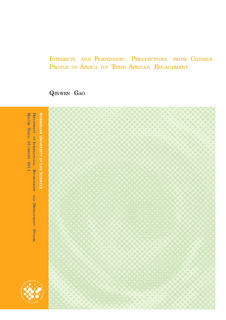Interests and friendship : perspectives from Chinese people in Africa on their African engagement
Master thesis
Permanent lenke
http://hdl.handle.net/11250/187745Utgivelsesdato
2011-09-28Metadata
Vis full innførselSamlinger
Sammendrag
China’s recent engagement in Africa has attracted a lot of attention. China has become a major economic force in Africa with a big amount of trade, investment and aid. Some criticisms, if not a demonization of China, often use a double-standard to measure the Chinese engagement in Africa compared with the Western one. This study tries to find information from the executors of the Chinese engagement in Africa and to make a balanced appraisal. The objectives include: 1. to assess the Chinese road to Africa; 2. to explore the chief feature of Chinese engagement in Africa; 3. to evaluate the impact on Africa’s development by China’s engagement.
The outcome embodies three points: 1. the rapid growth and diversified constitution necessitate an effective regulation on Chinese people in Africa; 2. the Chinese no-strings attached policy doesn’t impose any universalistic rules to Africa and leaves the self-determination to Africa; 3. Africa needs to find an appropriate way of development by itself, while China serves as both an opportunity and a challenge. To achieve mutual benefits and to develop the China-Africa relationship in a sustainable way, both China and Africa need to regulate the cooperation, especially when the scope is broader and the actors are diversified. Since the regulation of Chinese engagement in favor of African economy and citizens depends particularly on Africa, African countries should get motivated. A lack of an appropriate way of development is the most pressing problem for Africa. China’s own development is a process of experiments, in the words of Deng Xiaoping: “we are crossing the river by feeling the stones.” Chinese way of engagement leaves the autonomy to Africa. Africa can find its way to solve its problems. In this process, if the Sino-African relations are well managed, China could be helpful in many aspects.
Based on my findings, I argue that Sino-African mutual benefit is possible if Africa well uses the chance presented by China. It depends on Africa to regulate the Chinese engagement in favor of its own benefits.
